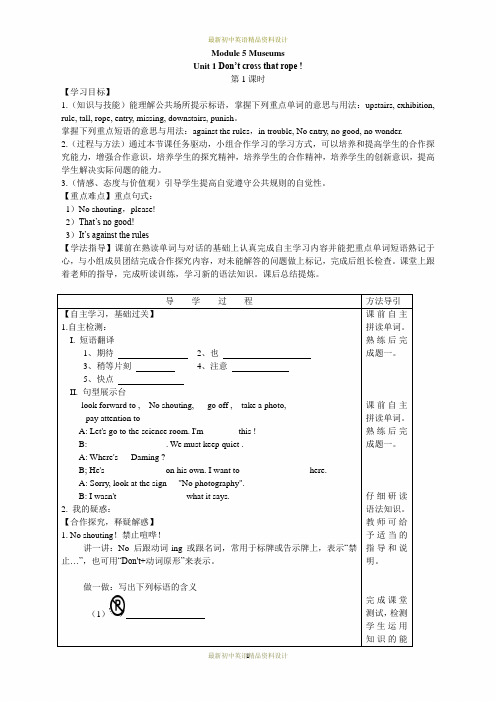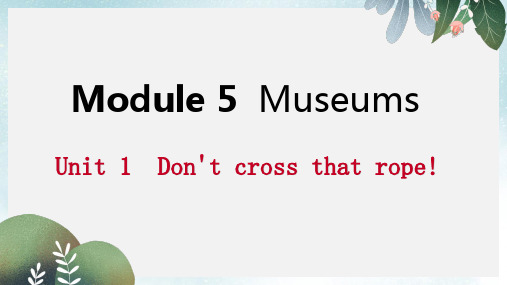最新外研版英语九年级上册Module 5 Museums Unit 1 Don’t cross that rope公开课课件
- 格式:ppt
- 大小:3.31 MB
- 文档页数:31



Module 5 MuseumsUnit 1 Don’t cross that rope !第1课时【学习目标】1.(知识与技能)能理解公共场所提示标语,掌握下列重点单词的意思与用法:upstairs, exhibition, rule, tall, rope, entry, missing, downstairs, punish。
掌握下列重点短语的意思与用法:against the rules,in trouble, No entry, no good, no wonder.2.(过程与方法)通过本节课任务驱动,小组合作学习的学习方式,可以培养和提高学生的合作探究能力,增强合作意识,培养学生的探究精神,培养学生的合作精神,培养学生的创新意识,提高学生解决实际问题的能力。
3.(情感、态度与价值观)引导学生提高自觉遵守公共规则的自觉性。
【重点难点】重点句式:1)No shouting,please!2)That’s no good!3)It’s against the rules【学法指导】课前在熟读单词与对话的基础上认真完成自主学习内容并能把重点单词短语熟记于心,与小组成员团结完成合作探究内容,对未能解答的问题做上标记,完成后组长检查。
课堂上跟着老师的指导,完成听读训练,学习新的语法知识。
课后总结提炼。
导学过程方法导引【自主学习,基础过关】1.自主检测:I. 短语翻译1、期待2、也3、稍等片刻4、注意5、快点II. 句型展示台look forward to , No shouting, go off , take a photo,pay attention toA: Let's go to the science room. I'm _______ this !B:__________________. We must keep quiet .A: Where's Daming ?B; He's _____________ on his own. I want to _______________ here.A: Sorry, look at the sign----"No photography".B: I wasn't _______________ what it says.2. 我的疑惑:【合作探究,释疑解惑】1. No shouting!禁止喧哗!讲一讲:No 后跟动词-ing或跟名词,常用于标牌或告示牌上,表示“禁止…”,也可用“Don't+动词原形”来表示。

Module 5 MuseumsUnit 1 Don’t cross that rope!教学目标【知识目标】1. 词汇rule entry missing2. 表示禁止的结构【能力目标】能听懂关于参观博物馆的语言材料以及表示禁止的语言, 能通过相关词汇或图片描述禁止做某事【情感目标】让青少年在亲身体验中学习知识, 培养热爱科学的意识教学重难点【教学重点】1. 领会并灵活使用以下词汇rule rope missing entry等单词2. 掌握重点句型:No smoking Don’t cross that rope No wonder……3. 理解并掌握表示禁止的结构【教学难点】能通过相关词汇或图片描述表示禁止的句子教学过程Step 1 Warming-up1. Show some pictures of the signs.2. Learn the new words.Step 2 Listening and vocabularyFinish Activi ty 1 on page 34.1. Ask the students to look at the pictures on the right in Activity 1.2. Read through the names of the signs.1) Don’t touch. 2) No smoking. 3) No shouting. 4) No photos.3. Match the signs with the rules.4. Check the answers.5. Now work in pairs. Tell your partner the rules.Step 3 Listen and answer the questions.1. Ask the students to read through the questions.1) Where did Lingling find the guide?2) How many people are going to the museum on Saturday?2. Play the recording and ask the students to listen carefully.3. Listen and answer the questions.4. Check the answers.Step 4 Listen and read1. Play the recording and ask the students to answer the questions.1) What room do the children want to visit?2) Are there lots of people in the museum?2. Check(√)the rules mentioned in the conversation.1) Ask the students to look at the pictures in Activity 3.2) Read the conversation again.3) Check (√) the rules mentioned in the conversation4) Check the answers.3. Read the conversation again and find main points.Step 5 Writing1. Write down what you cannot do in the museum.No shouting.Lingling and Betty needed some information for their projects, so they wanted to go (1) ___________ to the Animal Room, but Daming got into trouble at the monkey (2) ___________ . Daming broke the (3) ___________ by shouting and trying to cross the (4) ___________ when he planned to see a monkey with a long (5) ___________. Then they discovered that Lingling’s mobile phone was (6) ___________. The guard told them to go (7) ___________ to the lost and found office. Lingling has to find her phone, or her mother will (8) ___________ her.3) Complete the passage with the words in the box.4) Check the answers.Step 6. Learn “Everyday English〞Me too. No shouting, please!It’s against the rules. That’s no good! No wonder…Step 7 Language points1. No shouting, please! 请勿喧哗!Don’t cross that crop! 不要越过那条绳子!No photos. 请勿拍照.表示“禁止做某事〞. 主要结构:1) No + 动名词No fishing. 禁止垂钓. No parking. 禁止停车.2) No + 名词No entry. 请勿入内. No food and drinks. 请勿饮食.3) 祈使句Don’t make any noise. 不要吵闹.Keep off the grass. 请勿践踏草坪.2. It’s against the rules. 这违反了规定.against是介词, 表示“对抗, 违背, 相反〞, 句中against the rules作句子的表语. 该词可以构成很多词组. 如:Who are you playing against in the next match? 下一场比赛你们和谁对抗?3. That phone is new! I have to find it, or Mum will punish me!那部是新的. 我一定要找到它, 否那么妈妈会惩罚我的.punish v. 惩罚; 惩罚常用结构:punish sb. for sth./doing sth.e.g. He was punished for being late. 他因迟到而受到处分.5. It’s missing! 它丢了!missing adj. 找不到的; 失踪的辨析:lost/missing/gone三者都可表“失去〞. lost是广义的“丧失〞, 包含可找回和不能找回的意思; missing强调某物或某人暂时找不着了(含最终可能找到之意); gone的含义最广,包括“(东西)没了; (时间)过去了; (人)死了〞等,而且语气肯定.[运用]1) ______ time will never be found again.2) Someone reported to the police that a child was ________.3) The old times are ______ forever.Step 8 Pronunciation and speaking1. Play the recording once without stopping.2. Play the recording again and ask the whole class to repeat.1) No shouting, please! It’s against the rules.2) Because it’s closed.3) There certainly are a lot of rules in this museum.3. Ask the students to listen and underline the words the speaker stresses.4. Now listen again and repeat.Step 9 Discussion1. Read through the example with the class.— Must we keep quiet in the classroom?— Yes. No shouting in the classroom.2. Discuss the rules in your classroom.3. Work in pairs.Step 10 Exercises课堂作业1. Remember the words and phrases in Unit 1.2. Finish the exercises in the workbook.教学反思Unit 3 Language in use教学目标【知识目标】让学生能够使用在本模块所学的单词和短语.【能力目标】总结和理解if条件状语从句.【情感态度目标】在日常生活中能听懂他人的问题和给出建议, 做一个老实的人.教学重难点【教学重点】【教学难点】教学过程Step 1 Revision and lead-inLet Ss look at the pictures and answer the questions to review what they have learnt. Step 2 Language practice and grammarTo master the tense of the adverbial clause of condition.用所给单词的适当形式补全对话1. If I ______(start) the dinner, I ________ (finish) it before I go to bed.2. If you _____(do) these other things instead of your homework, you _______(not have) time to study.3. He thinks something _______(go) wrong if I play games on it.Grammar: If从句(2)一、引导条件状语从句最常用的连词是if, 常见的if条件状语从句表示在某条件下, 某事很可能发生.e.g. If you ask him, he will help you.如果你请他帮助, 他会帮你的.If he does not work hard, he will fail his exams.如果他不努力, 考试就要不及格了.二、If从句的时态1. if从句用一般现在时, 主句用一般将来时.e.g. If he runs, he’ll get there in time.如果他跑着去, 他就会及时赶到那儿.2. if从句用一般现在时, 主句用情态动词+动词原形.e.g. She may come with us if she arrives in time.如果她来得及时, 就可以和我们一道去.三、if 引导的条件状语从句位置灵活, 可直接放在主句后面, 也可以放在句首. 放在句首时, 从句后面要用逗号和主句隔开.e.g. I’ll go to see you if I have time. 如果有时间, 我就去看你.If it rains tomorrow, we’ll stay at home. 如果明天下雨, 我们就待在家里.四、同义句转换用“祈使句+and / or +一般将来时的句子〞转换.e.g. If you work hard, you’ll pass the exam easily.→ Work hard, and you’ll pass the exam easily. 努力学习, 你将很容易通过考试. If you don’t hurry up, you’ll miss the train. → Hurry up, or you’ll miss the train.快点儿, 否那么你就赶不上火车了.Exercises1.If you ____ to the party, you’ll have a great time.A. will goB. wentC. goD. going2. I ______ her the answer if she _______me.A. can tell, will askB. will tell, will askC. would tell, askD. will tell, asks3. -What are you going to do tomorrow?-We’ll go to the library tomorrow if it ______.A. isn’t rainB. rainC. won’t rainD. doesn’t rain4. I’ll give the book to him if he _____ here next Sunday.A. will comeB. comesC. is comingD. cameStep 3 Join the sentences with if●The teacher show Ss how to join the sentences with if.Listen in class, or you will not understand what to do.If you do not listen in class, you will not understand what to do.1. Eat your breakfast, or you will get hungry at school.If you do not eat your breakfast, you will get hungry at school.2. Hurry up! You will be late.If you do not hurry up, you will be late.3. Read the book carefully. Then you will not make mistakes.If you read the book carefully, you will not make mistakes.4. Don’t watch too much TV, or your eyes will hurt.If you watch too much TV, your eyes will hurt.5. Work harder! You will get higher marks.If you work harder, you will get higher marks.●Let Ss write new sentences with if.Step 4 Make a survey1.Think of three problems you have in your schoolwork.2.Make notes about them in the Problem boxes.Now work in pairs. Talk about your problems and give advice to each other. Complete the table.-I can’t speak English well.-If you practise more outside the classroom, you will make progress.Step 5 Complete the sentences so that they are true for you1. Read the sentences carefully.2. Use the correct words to fill in the blanks1 I will be really happy if________________.2 I will do well in English if______________________________.3 My parents will be angry if____________________.4 If it rains next Saturday, I_____________________.Step 6 Complete the conversation with the correct form of the words and expressions in the box1.Read the conversation carefully.2.Now complete the conversation with the words or expressions in the box.Step 7 Complete the passages with the correct form of the expressions in the box1. Read the passages carefully.2. Now complete the passages with the words or expressions in the box.Step 8 Read the problems and give your adviceStep 9 ListeningListen to the conversation and answer the questions.1. What is the girl’s problem?2. Is it a common problem among teenagers?3. What does the doctor advise the girl to do?4. What does the doctor advise the girl not to do?Step 10 Around the worldLearn about the advice columns.Read the passage and fill the blanks.1. Advice columns have been used since ___________________.2. In the past, advice columns could mainly be found in _______________________.3. Nowadays, _______________________are much more popular.Step 11 Writing1. Work in pairs. Write a letter about a problem.2. Decide on advice for the problems in groups.3. Make a problem page.Step 12 PracticeDo some exercises from the entrance exam to senior high schools.1. -Would you like to go shopping with me, Carmen?-I’d love to, ____ you don’t want to go alone.A. untilB. beforeC. if2. You will be late for school ____ you don’t get up early.A. butB. ifC. andD. or3. -Please give Alice the story book ____ you see her.-All right.A. unlessB. orC. butD. if4. If the weather ____ fine, we ___ have a sports meeting this weekend.A. will be; willB. is; willC. was; would5. He will go to the mountains with his parents if it _____ next Sunday.A. won’t rainB. doesn’t rainC. isn’t rainD. will rain6. If she _____ tomorrow, I’ll call you.A. comeB. comesC. will comeD. came课堂作业假设你是Lucy, 你的笔友Mary给你写了一封信, 告诉你她现在的问题, 请你给她写一封回信, 并给她提出你的一些建议.Dear Lucy,I am a good girl but I am not good at studying. I like watching TV so much that I can’t stop myself from watching it. My parents have tried their best to stop me watching TV too much. They argued〔争吵〕with me about it. I was so angry with them that I left home. The problem makes me very sad and I don't know what to do. Can you help me?Yours,Mary教学反思。


Module 5 Museums. Unit 1 Don ’t cross that rope!教学过程题 目新标准英语(2011年)九年级上册Module 5 Museums.Unit 1 Don’t cross that rope!教材分析《Don’t cross that rope!》是外研社《新标准英语》(三年级起始)九年级上册第五模块第一单元的内容。
第一单元着重介绍了Betty 和小伙伴们参观博物馆的情景。
其间,Daming 扮演了一个“好动”人物的角色,他总是做出各种违规的举动,以呈现本课表达“禁止”做某事的语言内容,对话告诉学生需要建立起遵守公共场所秩序和规则的意识。
学情分析九年级学生的英语基础参差不齐,尤其是很多学生表现出对英语不感兴趣,所以在整个教学过程中,教师应该关注如何利用信息化手段引起学生学习英语的兴趣,寻找更多适合的方法来指导学生学英语并鼓励他们为主。
学生对本模块的中心话题应该会很感兴趣,各公共场合标志图和标示语的意思都为学生所熟悉,所以便于开展听、说、读、写活动,激发学生的学习热情,积极参加小组活动。
在本课的讲练过程中,我将设计多个任务由学生完成,让学生自主参与到学习过程中。
学习目标知识 技能 目标 1. To learn new words of Unit 1. 2. To learn how to introduce the signs.3. To be able to understand the conversation of visiting a museum. 能力 目标 To make a new dialogue about family rules. 情感 态度 目标 To be able to obey the rules in public. 学习 重点 难点To learn how to introduce the signs. To make a new dialogue about family rules.教师准备 希沃5课件,EVC 手绘微课,歌曲动画视频,课文音频和动画视频。
外研版九年级上册Module 5 Museums Unit1 Don’t cross that rope! (第1课时)一、教学目标1.学生能够掌握本单元的重点词汇,如:museum, against the rules, entry 等。
2.理解并能运用“Don’t...” 这一祈使句的否定形式来表达禁止和劝阻。
3.能够听懂关于博物馆规则的对话,并获取关键信息。
二、教学重难点重点:1. 重点词汇的学习和记忆。
2. 理解和运用“Don’t...” 句型。
难点:准确理解听力材料中关于博物馆规则的复杂表述。
三、教学方法情景教学法、听说训练法、任务驱动法四、教学过程Step 1 Lead-in1.Show some pictures of famous museums on the screen, such as the British Museum, the Louvre Museum, and the Palace Museum. Ask students: "What can you see in these pictures?" "Have you ever been to a museum?"2.Encourage students to share their experiences in museums.Step 2 Vocabulary Learning1.Present the key vocabulary of this unit on the screen.2.Let the students read the words after the recorder.3.Conduct spelling exercises and vocabulary games to reinforce students' memory of the words.Step 3 Sentence Pattern Learning1.Introduce the negative imperative sentence pattern "Don’t..." and explain its usage and meaning.2.Illustrate with examples like "Don’t talk loudly in the library." "Don’t play football in the street."3.Explain that "Don’t" is used to tell someone not to do something and it is often followed by a verb in its base form.4.Ask students to make sentences using the "Don’t..." pattern based on given situations or pictures. Step 4 Listening Practice1.Play a listening material about museum rules. Before playing, give students some questions to think about:"What are the rules in the museum?" "Why are these rules necessary?"2.Play the recording for the first time and ask students to answer the questions.3.Play the recording again, pausing at key points to explain difficult words and expressions. Then havestudents repeat the sentences they hear to improve their pronunciation and intonation.Step 5 Dialogue Practice1.Divide students into pairs and give them a situation in a museum. Ask them to create a dialogue using the key vocabulary and the "Don’t..." sentence pattern.2.Invite several pairs to perform their dialogues in front of the class. The rest of the students should listen carefully and give comments or suggestions.3.Provide feedback and correction on students' pronunciation, grammar, and fluency.Step 6 Class Summary1.Review the key vocabulary and the "Don’t..." sentence pattern learned in this class.2.Summarize the main points and difficulties in the listening and dialogue practices.Step 7 Homework Assignment1.Ask students to recite the key vocabulary and write them down three times each.2.Ask students to write five sentences using the "Don’t..." pattern about school rules.五、板书设计Module 5 Museums Unit1 Don’t cross that rope! (第1课时)against the rulesSentence Pattern: Don’t...Listening Questions:1.Rules mentionedDialogue Practice: Scenes and Key Points六、教学反思在本课时的教学中,通过丰富的图片和情景导入,成功吸引了学生的注意力,激发了他们的学习兴趣。
Module 5 MuseumsUnit 1 Don’t cross that rope!1. Don’t touch. No smoking. No shouting. No photos.禁止触摸。
禁止吸烟。
禁止大喊大叫。
禁止拍照。
(教材34页,1) 本课重要结构:“禁止做某事”,常用于公共场合警示语。
① Don’t +动原(+其他)✧ Don’t cross that rope!不要越过那条绳子! ② No+v-ing.✧ No fishing. 禁止垂钓。
③ No+名词.✧ No entry. 禁止入内。
④ 主+ must not(mustn’t) +动原(+其他) ✧ You mustn’t swim in the lake. 不能在湖里游泳。
(2021·全国·单元测试)What does the signmean?A. No parking.B. No photos.C. No entry.D. No smoking.2. Betty, Lingling and Daming are on the second floor of a museum. 贝蒂、玲玲和大明正在一家博物馆的三楼。
(教材第34页,3) the second floor 三楼在英式英语中,地面的一层叫ground floor ,上面一层叫first floor 。
在美式英语中,地面的一层叫first floor ,上面一层叫 second floor 。
【拓展】表示“在第几楼层”时用介词on 。
✧ His office is on the third floor. 他的办公室在四楼。
3. What a wonderful museum! 多么奇妙的一家博物馆啊!(教材第34页,3)what 引导的感叹句 一般有三种句式结构:①What+a/an+形容词+可数名词单数(+主语+谓语)! ✧ What a pretty girl (she is) !(她是)多么可爱的一个女孩啊!②What+形容词+可数名词复数(+主语+谓语)!✧ What pretty girls (they are) !(她们是)多么可爱的女孩啊!知识精讲③What+形容词+不可数名词(+主语+谓语)✧What good points(it is)!多么好的观点啊!【拓展】how引导的感叹句结构:How+形容副词(+主语+谓语)!【辨析】What a +形容词+名词(+主语+谓语)!= How +形容词+a +名词(+主语+谓语)!✧What a good boy he is! =✧How good a boy he is! =✧How good the boy is! 多么好的一个男孩儿啊!总结:感叹句中核心词是名词用what引导;核心词是形容词或副词用how引导。